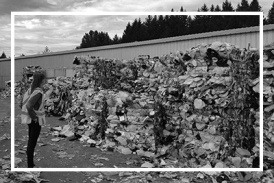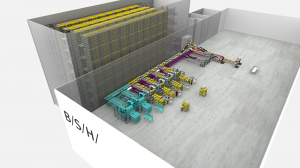BSH Hausgeräte GmbH relies on TGW Logistics
Starting in spring 2027, TGW technology will be responsible for production supply in one of the largest and most modern dishwasher factories in the world.
MARCHTRENK, AUSTRIA, April 15, 2025 /EINPresswire.com/ -- In the Bavarian district of Dillingen, ground was recently broken for a shuttle warehouse for the home appliance specialist BSH Hausgeräte GmbH. By spring 2027, TGW Logistics will complete a highly automated mini-load warehouse that will supply production with components reliably and quickly. More than 50 shuttle robots will ensure that the required components are supplied to the assembly workstations at just the right moment.
BSH Hausgeräte GmbH represents a portfolio of world-renowned home appliance brands, including Bosch, Siemens, Gaggenau and Neff. The company employs 60,000 people and generated a revenue of 14.8 billion euros in 2023. Founded in 1960, the Dillingen factory produced roughly 1.9 million washing machines in 2024, making this location one of the largest and most modern washing machine factories in the world.
AUTOMATED GUIDED VEHICLES AS AN EXPANSION OPTION
As part of a revised factory layout, the material flow is also being reimagined, prompting a sustainable boost in speed and efficiency. A highly automated shuttle system will play a central role as buffer for the production supply. More than 50 shuttle robots will handle the reliable storage and retrieval of components. This way, the workstations can be supplied with components just in time. What's more, the trendsetting final assembly concept will establish an environment free of forklift trucks, thus paving the way for the use of automated guided vehicles (AGVs).
HIGH EFFICIENCY IN DAY-TO-DAY OPERATION
"Automation combined with optimal space utilization through quintuple deep storage in the shuttle system will enable high efficiency," emphasizes Johann Steinkellner, CEO of the Central Europe Customer Unit at TGW Logistics. "We are delighted that BSH found our concept so persuasive. This is already TGW Logistics' second collaboration at the Dillingen location, and we are confident that more will follow."
TGW Logistics
TGW Logistics
email us here
Legal Disclaimer:
EIN Presswire provides this news content "as is" without warranty of any kind. We do not accept any responsibility or liability for the accuracy, content, images, videos, licenses, completeness, legality, or reliability of the information contained in this article. If you have any complaints or copyright issues related to this article, kindly contact the author above.
COMMUNITY SECURITY SERVICE BOLSTERS DEFENSES IN RESPONSE TO ELEVATED THREAT WARNING FROM DHS/FBI
From Messy Moments to Meaningful Memories: 'Once Upon an Amateur Mom' is a Tribute to Mothers Everywhere
Ralph Caruso’s Above The Line Production Rentals Celebrates 10 Years of Growth as Key Supplier to Top Film Productions
Kalendarium
Więcej ważnych informacji
 Jedynka Newserii
Jedynka Newserii

 Jedynka Newserii
Jedynka Newserii

Handel

Ze względu na różnice w cenach surowce wtórne przegrywają z pierwotnymi. To powoduje problemy branży recyklingowej
Rozporządzenie PPWR stawia ambitne cele w zakresie wykorzystania recyklatów w poszczególnych rodzajach opakowań. To będzie oznaczało wzrost popytu na materiały wtórne pochodzące z recyklingu. Obecnie problemy branży recyklingu mogą spowodować, że popyt będzie zaspokajany głównie przez import. Dziś do dobrowolnego wykorzystania recyklatów nie zachęcają przede wszystkim ceny – surowiec pierwotny można kupić taniej niż ten z recyklingu.
Przemysł spożywczy
Rośnie presja konkurencyjna na unijne rolnictwo. Bez rekompensat sytuacja rolników może się pogarszać

Rolnictwo i żywność, w tym rybołówstwo, są sektorami strategicznymi dla UE. System rolno-spożywczy, oparty na jednolitym rynku europejskim, wytwarza ponad 900 mld euro wartości dodanej. Jego konkurencyjność stoi jednak przed wieloma wyzwaniami – to przede wszystkim eksport z Ukrainy i niedługo także z krajów Mercosur, a także presja związana z oczekiwaniami konsumentów i Zielonym Ładem. Bez rekompensat rolnikom może być trudno tym wyzwaniom sprostać.
Transport
Infrastruktury ładowania elektryków przybywa w szybkim tempie. Inwestorzy jednak napotykają szereg barier

Liczba punktów ładowania samochodów elektrycznych wynosi dziś ok. 10 tys., a tempo wzrostu wynosi ok. 50 proc. r/r. Dynamika ta przez wiele miesięcy była wyższa niż wyniki samego rynku samochodów elektrycznych, na które w poprzednim roku wpływało zawieszenie rządowych dopłat do zakupu elektryka. Pierwszy kwartał br. zamknął się 22-proc. wzrostem liczby rejestracji w ujęciu rocznym, ale kwiecień przyniósł już wyraźne odbicie – o 100 proc.
Partner serwisu
Szkolenia

Akademia Newserii
Akademia Newserii to projekt, w ramach którego najlepsi polscy dziennikarze biznesowi, giełdowi oraz lifestylowi, a także szkoleniowcy z wieloletnim doświadczeniem dzielą się swoją wiedzą nt. pracy z mediami.









.gif)

 |
| |
| |
|